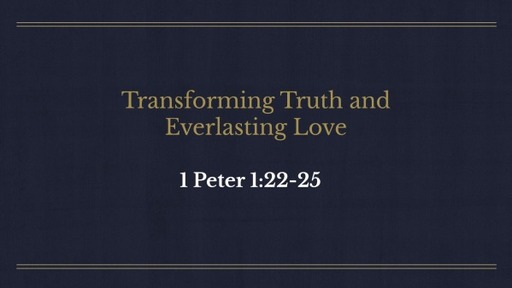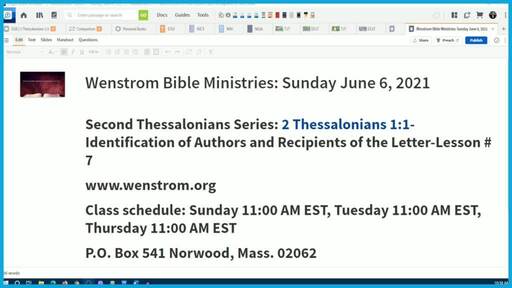2 Thessalonians 2:1-5
Notes
Transcript
The Day of the Lord
2 Thessalonians 2:1-5
Intro: There’s a connecon between the mind and the heart. What we
think does something to what goes on in our hearts. When we’re talking
about being unshaken we’re talking about what can happen in both. Our
belief is shaken and fear and doubt and worry flood in. That’s what Paul is
trying to guard the Thessalonians against. The Thessalonians are in the
middle of a potenal crisis of faith. To deal with that Paul gives truth.
There’s the connecon—what happens in our heart is impacted by what’s
in our head. That’s what Paul has been doing this whole leer. He’s gone
aer their crisis of faith by giving them truth.
I’m poinng this out because Paul keeps doing the same thing in chapter
2. We know part of their crisis has to do with suffering. And it chapter 2
we see it also has to do with the end of the world and the return of Jesus.
READ PASSAGE
I. Crisis of Faith vv. 1-2
A. Paul says, don’t be Shaken in mind & alarmed
1. There’s the connecon I talked about
2. Shaken in mind—that’s our intellect, what we know.
3. And don’t be alarmed: inner turmoil; you’re disturbed or
frightened.
B. What had the Thessalonians alarmed was the Day of the Lord;
specifically the thought that they had missed it.
1. Let’s get a bigger picture of what’s going on here.
2. Back in 1 Thessalonians 4 Paul brought this up
Next Page: 1 Thessalonians 4:15-18
1 Thessalonians 4:15-18 For this we declare to you by a word from the
Lord, that we who are alive, who are le unl the coming of the Lord, will
not precede those who have fallen asleep. For the Lord himself will
descend from heaven with a cry of command, with the voice of an
archangel, and with the sound of the trumpet of God. And the dead in
Christ will rise first. Then we who are alive, who are le, will be caught up
together with them in the clouds to meet the Lord in the air, and so we
will always be with the Lord.
3. We call this event the rapture (we get the word rapture from
the Lan word for ‘caught up’).
C. And Paul means this to be encouraging—he ends that secon by
saying, “encourage one another with these words.”
1. But somewhere along the line the Thessalonians stopped being
encouraged, and became shaken and alarmed.
2. And so Paul comes brings it up again
Point: the link between 1 Thessalonians 4 and 2 Thessalonians 2 is idea of
being gathered together to Christ. That’s what happens in 1
Thessalonians 4 (we’re caught up together with other Chrisans to meet
Jesus) and it’s the same in 2 Thessalonians 2 (we’re gathered together to
Jesus).
Transion: So both leers deal with the same event. The first leer is
about explaining what will happen, and the second leer is about
explaining when it will happen. So, would you like to know when the
rapture will happen? Paul doesn’t give us a day and me, but he does
give us a window.
Next Page: One word of cauon before we begin…
II. When will Jesus return and rapture the church?
A. One word of cauon before we begin. This is an important
queson, otherwise Paul wouldn’t bring it up.
1. But it’s not the most important thing in Chrisanity.
2. ill. the last me I preached on ‘when the rapture will happen’
someone le the church, because we answered the queson
differently. That’s silly.
3. The most important thing for Chrisans to believe about the
return of Jesus is that he is returning.
a) Disagreeing about the details of how it will happen is like
disagree on wether steak or fish is beer.
b) Our preferences may be different, but we both agree that
the most important thing is food, right! You wouldn’t leave
the dinner table if I thought one way and you thought
another?
Transion: so let me put my cards out on the table. I believe the rapture
will happen aer the tribulaon—so the church will go through it. And
these next verses are the main reason why. vv. 3-4, 8-9
B. Paul starts by saying, “that day will not come unless”
1. So, everything that follows will happen before we are gathered
together with Jesus.
Next Page: Paul tells us 6 things
C. Paul tells us 6 things:
1. The rebellion comes first
2. The man of lawlessness is revealed (everything else is about
this man)
3. He exalts himself over every object of worship
4. He proclaims himself to be God.
5. His coming is with Satanic power to work false signs & wonders.
6. And Jesus will kill him when he returns.
D. I’m not going to go into a lot of detail here, mainly because I don’t
have me. But I do what you to know that everything Paul says in
these verse are things that happened during the great tribulaon.
1. First, Paul menons “the rebellion.” Not ‘a’ rebellion, but ‘the’.
a) I’ll try and make more sense of this next week, but there’s
something final and ulmate in what Paul is saying here.
2. And then Paul goes on to describe the man of lawlessness; and
everything Paul says about this man are things the Bible
associates with the an-Christ. (Daniel 7; Rev. 13, 17).
a) For me, what seals the deal, is this man will be killed when
Jesus returns—so he’s going to be alive on the earth when
Jesus returns.
Point: all of this will happen before we are gathered together w/ Jesus.
Which means the Church (Chrisans) are going to be here, on the earth,
during the most intense me of persecuon and suffering.
Next Page: So, Why does this maer? What is Paul doing here?
III.Why does this maer? What is Paul doing here?
A. The first thing is straight forward: Don’t let people talking about
the end of the world mess with you.
1. How many ‘end of the world’ predicons have we had in the
last 10 years?
a) Mayan Calendar predicted the world would end in 2012.
b) In 2015 we had the Blood Moon predicons.
c) And the unseen Planet X was supposed to destroy the
world two months ago.
• Since 2010 there have been 30 documented large-scale predicons that
the world would end. (Ranging from Isaac Newton to Pat Robertson).
2. My guess is, the closer we get to the end of the world, the
more credible those predicons will look: don’t be shaken.
Next Page: But there’s something else going on here: it’s what I want us
to take away from all of this.
B. But there’s something else going on here: it’s what I want us to
take away from all of this.
1. Why would the Thessalonians be tripped up? What was going
on in their life?
2. They were suffering—& it was easy for them to believe that
they had missed Jesus. Why else would life be so hard?
3. Paul says, “You haven’t missed the Day of the Lord,” which is
another way of saying, “Jesus hasn’t abandoned you.”
Paul takes it a step further; things are hard now, but there going to get
even harder. And even then Jesus hasn’t abandoned you.
C. Weather the end of the world comes in our lifeme or not, the
reality is as Chrisans we will suffer. Some of our suffering is self
inflicted, some comes from living in a fallen and broken world, and
some comes from persecuon.
1. And it’s not about comparing your suffering to someone else’s.
2. ill. Breaking your leg hurts more than cung your finger, but
that doesn’t mean cung your finger doesn’t hurt!
D. The truth is, suffering can make us doubt that God is with us.
1. Nothing will shake your faith more than doubng that Jesus is
with you and for you.
2. Suffering can do that: Listen to what David wrote in Psalm 22.
Psalm 22:1-2 My God, my God, why have you forsaken me? | Why are
you so far from saving me, from the words of my groaning? O my God, I
cry by day, but you do not answer, and by night, but I find no rest.
Forsaken: that’s a good word to describe how we feel when life is hard,
miserable. It means ‘le behind,’ abandoned…
IV.Against everything that could shake our faith we have God’s truth v. 5
A. Paul says, “You already have all the truth you need to keep you
from being shaken—I told you when I was there.”
B. Of course we don’t have a memory of when Paul, or any other
apostle was here, teaching us.
1. We have something beer—the Bible.
2. I say it’s beer because you can go and listen to what the Bible
says every day, a thousand mes a day.
3. That’s beer than the memory of a three month visit from an
apostle.
Point: when our faith is shaken by suffering or anything else, I can hear
God saying, “Don’t you remember I told you theses things.”
C. And when you open the Bible, you know what you find? Christ.
1. You find a King who humbled himself and was sacrificed for
you, to reconcile you to God, who loves you and forgives you.
2. And you find a Savior who says, “I will never forsake you.”
Conclusion: wether we’re living through the last days of the world, or
through a difficult season of life, God tells us, “Don’t you remember I told
you theses things.”
• And that’s not a sarcasc burn. It’s an invitaon.
• Some of you feel forsaken. You might not be worried that you’ve
missed the second coming of Jesus, but you sll feel abandoned.
• God hasn’t le you. God hasn’t thrown up his hands and
walked away from this world.
• What you need most is to remember what God has said.






